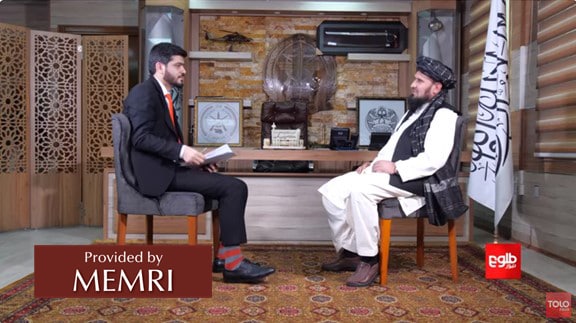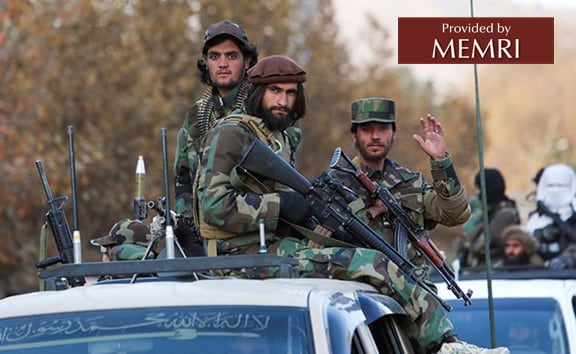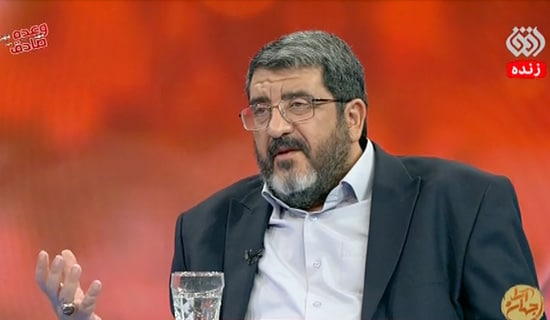In a recent interview with the ToloNews, Qari Fasihuddin Fitrat, the chief of the General Staff of the Taliban's Armed Forces, was asked about reports of Taliban members arresting, harassing, and killing former soldiers and officials who had served during the Republic era (2002-2021). Qari Fasihuddin Fitrat responded, "I reject this. This is a lie. It has no basis; and no one who was in the previous system has been arrested, imprisoned, beaten, and this is false news."[1]
Three days after the Taliban fighters entered Arg, the Presidential Palace, in Kabul on August 15, 2021, a "General Amnesty" was announced by Enamullah Samangani, a member of the Cultural Commission of the Islamic Emirate of Afghanistan (IEA, i.e., the Afghan Taliban), who also told Afghans: "You should restart your routine life with full confidence." So, Qari Fasihuddin Fitrat's contention that reports about the Taliban forces killing former officials have no basis could be believed if the amnesty was upheld. However, evidence appearing in Afghan media contradicts Qari Fasihuddin Fitrat's denial because the Taliban forces are killing former soldiers regularly.

Qari Fasihuddin Fitrat (right), chief of the General Staff of Afghan Taliban armed forces
On February 19, General Farid Ahmadi, the commander of the Commando Corps in the former government, said in an interview that the Taliban rulers had promised general amnesty, but it was a false promise. The Taliban had detained thousands of former soldiers and security officials since they took control of Afghanistan, he said, adding that this policy had forced them to form a group of 9,000 commandos aimed at supporting the former security forces. General Ahmadi said that the Taliban's refusal to uphold their promise of general amnesty and betrayal has deepened the sense of distrust among the Afghan populace. He said his group's long-term goal is to liberate Afghanistan from the Taliban.
In January 2022, the Guardian quoted the United Nations as saying that it received "credible allegations" that more than 100 members of the ousted Republican regime, its security forces, and those who worked with international troops had been killed since the Taliban took over control of Afghanistan.
In April 2022, an international media report highlighted that the Taliban targeted and executed former soldiers and officials, subjecting them to torture and death. Specifically, the report documented the tragic fates of several people: Banu Negar, a female police officer, was murdered on September 5, 2021; four former soldiers met a similar fate in September 2021; Mohammad Hashim, an Afghan police chief, was assassinated on October 1, 2021. Furthermore, the report revealed that within the first eight months of the Taliban's control of Kabul, 490 former soldiers and their family members either disappeared or fell victim to violence.
Not all the killings by the Taliban are reported. It is not possible to list all such killings. However, if we examine reports that have appeared in the Afghan media during the first three months of 2024, Qari Fasihuddin Fitrat's claim falls flat on its face. Let us look at some of the recent cases that reveal how the Taliban are targeting and killing former security personnel systematically.
In March this year, Afghan media reported several cases of former security officials being arrested, tortured, or killed by the Taliban forces. According to a report published by Afghanistan International on March 3, the Taliban intelligence forces arrested Agha Lali, a former national security director of Lashkargah City, along with seven of his former colleagues. The arrests occurred in various areas of the city of Lashkargah in Helmand province. Lali and his colleagues had served during the previous government of Afghanistan.
In the first week of March 2024, Paigah News Agency published a report, saying that the Taliban had set fire to the house of Kamaluddin Nezami, the former governor of Panjshir province. According to the report, the Taliban had converted Nezami's house into a camp, where ten Taliban soldiers were stationed. This cruel act not only targets individuals but also tries to remove any signs of resistance to the Taliban rule.
On March 11, 2024, NRF News reported, the Taliban killed a former security official in Kabul City. The victim, identified as Asadullah, had previously served in the National Directorate of Security in Jawzjan province during the Republic era. This act of violence serves as a stark reminder of the grave consequences faced by those who oppose Taliban rule or served during the previous government. On the same day, March 11, the Taliban arrested a former member of the police forces named Shafi Ahmad. Ahmad, a resident of Panjshir province, was arrested in Kabul city. According to the Khorasan Times, he had served during the Republican era.
SUPPORT OUR WORK

On March 24, as the NRF News has reported, the Taliban killed a former member of the Afghan army in the Koh Daman region of Kabul province. According to the report, Colonel Tawoos was working in his field when the Taliban arrested him, tortured him, stabbed him, and ultimately killed him by gunfire. The killing of Tawoos shows the Taliban's ruthless tactics in eliminating perceived threats to their authority. On March 25, the Taliban forces killed Basheer, a former member of the local police, in Kunduz City near his residence, As the Paigah News Agency has reported. Basheer had worked during the previous government.

Chief of the General Staff of Afghan Taliban's Armed Forces Qari Fasihuddin Fitrat and Defense Minister Mullah Yaqoob Mujahid inspect weapons at the Defense Exhibition of Weapons (DEMDEX), Qatar, in the first week of March 2024
In the last week of March, the NRF News Agency reported that the Taliban had arrested three people in Panjshir province. These individuals had previously worked in the security departments of the former Afghan government. The arrests occurred in the Khenj district of the province. This highlights the Taliban's systematic targeting of people associated with the former government and contributing to widespread fear among the population.
On March 28, Afghan journalist Sami Jahesh shared a picture on X (formerly Twitter), saying that Dawlat Mohammad, who served as the officer of Maimay district also known as Darwaz-e Payeen district in Badakhshan province under the previous government, had surrendered the district to the Taliban in exchange for money. This resulted in the deaths of 25 personnel from that district, including the deputy national security and the police commander. The tweet also said that Dawlat Mohammad had since entered Iran on the Taliban's orders and introduced himself as a member of the National Resistance Front (NRF) of Afghanistan, one of the main anti-Taliban resistance groups. If this report is correct, it means the Taliban might be pursuing their opponents abroad.
During January and February 2024, a similar pattern can be seen of the Taliban forces systematically targeting the former security and police officials. On January 4, A Taliban member killed a former government police officer in the Gizab district of Uruzgan province. The Taliban intelligence arrested a former government soldier named Mohammad Amin in the Yakawlang district of Bamyan province on January 8 of this year. Ali Gul Haydary, a former commando of the previous government, was killed by the Taliban in Kabul on January 16. The Taliban forces shot and killed two former soldiers in the Kuh-e Chehel Dokhtaran area of Kabul on January 16.
On January 18, the Taliban killed a person in Kabul who had previously worked in the security sector during the former government. The victim, identified as Ali Gul Hussaini, hailed from the Nawur district of Ghazni province. He had recently returned to Afghanistan from Iran. On January 18, the Taliban arrested Sayed Mustafa, a former army officer from Bamyan province, accusing him of being the main perpetrator of the bombing in front of the Barchi City Center in western Kabul. On the same day, former national security soldier Mohammad Yasir was mysteriously shot dead in Dah village of Baharak district, Badakhshan province. Yasir had served in the government before the Taliban seized power in August 2021.
On January 19, a car belonging to a Taliban judge struck and killed Javad Azimi, a former member of the security forces in Takhar province. The incident occurred after a confrontation between the Taliban judge's son and Azimi, leading to an attack by the judge. The Taliban arrested two soldiers of the former government, Abdul Azim and Golestan, both residents of Panjshir province, in Kabul on January 20. The body of Sardar Mohammad, a former Afghan soldier, was discovered two months after his arrest by the Taliban. The incident occurred in Pol-e-Khomri city of Baghlan province on January 20. The Taliban forces arrested Atajan Haqbayan, the former head of the Zabul provincial council, in Shahr-e-Safa, Zabul province on January 20. On January 24, the Taliban arrested Obaidullah, a former soldier, in Kabul city. He had been residing in Kabul but originally hailed from the Abshar district of Panjshir province.
Incidents in February 2024 also refute Qari Fasihuddin Fitrat's claim that the Taliban are not involved in such activities. On February 1, the Taliban shot dead Muhammad Ishaq, the former chief of the Directorate of Crime of the Tala Wa Barfak district of Baghlan province. Safiullah, an associate of local Taliban commander Qari Miraj shot Ishaq in front of people in the district. On February 1, the Taliban intelligence arrested three members of the security forces of the former government of Afghanistan in Bamyan province.
The Taliban intelligence forces arrested Abdul Rahman Zarmati, the former district governor of Zurmat district of Paktia province, from the Ahmad Shah Baba Mina also known as the Arzan Qimat area of Kabul on February 3. Taliban killed Sa'adullah, a former member of the security forces of the previous government, in the Sayed Khel district of Parwan province. Sa'adullah, a former police officer, had been previously detained by the Taliban. Despite his release facilitated by local elders, he was tragically killed by the Taliban on February 3, 2024.

Afghan Taliban forces have emerged as the face of persecution of women and opponents (image courtesy: Twitter)
On February 4, it emerged that the Taliban militants killed a former soldier of the previous government in the Imam Sahib district of Kunduz province. The Taliban accused him of being a member of ISKP and they presented him to the public as a kidnapper. Shockingly, on December 2023, his body was displayed in public for hours after the incident. Paigah News Agency published a report on February 4, saying that the Taliban took a former soldier named Saja out of his house in Saadullah village and shot him dead in Sayed Khel district of Parwan province.
On February 8, the Taliban fighters killed a former government soldier named Shafiq in the Dand Wa Patan district of Paktia province. Shafiq served as a soldier in the second border battalion of Paktia province during the previous government of Afghanistan. On the same day, Reza, a former soldier who had served in the police headquarters of Daykundi province, was arrested by the Taliban fighters in the Jalrez district of Maidan Wardak province.
The Taliban fighters also arrested a security official of the former government in the Jalrez district of Maidan Wardak province on February 9. On the same day, the Taliban killed Abdullah Nahrinwal, a former military commander of the previous government, in the Nahrin district of Baghlan province. On the very next day, Khaso Khan, a former government soldier, was shot dead by the Taliban in Ghalbla village of Almar district, Faryab province.
An anti-Taliban X (formerly Twitter) account shared a post on February 14 saying that Afghan Taliban fighters attacked the residence of former government security official Hussain Hussaini in Kabul City. The attack led to his death. Paigah News Agency released a report on February 17, saying that the Afghan Taliban fighters abducted the families of three former soldiers in the village of Mian Shahr, located in the Khost district of Baghlan province. On February 18, Afghan Women News published a report detailing the arrest of Qaisar Khanjari, a former government policeman residing in the Khushamand district of Paktika province the Taliban regime. Khanjari, recently deported from Iran, had sought refuge in Helmand province, where he resided in a relative's house.
Amidst such incidents, reports of atrocities committed by the Taliban regime continue to surface, raising grave concerns about human rights violations and the erosion of civil liberties. The abduction and detention of people like Khanjari reflect a broader pattern of intimidation and repression. On February 9, a report published by the Hasht-e Subh Daily revealed that soldiers of the former Republic regime, who are currently residing in Pakistan, forwarded a letter to the United Nations on February 8. The letter highlighted the alarming situation in Afghanistan since the fall of the Republic government to the Taliban, noting that hundreds of soldiers are being subjected to daily arrests, torture, and killings by the Taliban.
Despite Qari Fasihuddin Fitrat's strong denials of mistreatment, detention, killing, and violence against former soldiers and officials from the previous governments, the situation on the ground presents an alarming reality. This contradiction exposes the hypocrisy of the Taliban regime and its double standards. While projecting a sanitized facade to the world, the Taliban engage in harsh actions against former officials. During the Republic era from 2002 to August 2021, Afghanistan aimed to establish democratic governance, rule of law, accountability of those in power, and a culture of human rights. However, the Taliban's behavior since seizing power in August 2021 reflects a disregard for these principles, perpetuating violence and repression against the Afghan people.
After Prophet Muhammad's victory in Mecca in the years 629-630, he displayed remarkable mercy and forgiveness. Despite facing years of hostility and persecution from the non-Muslims of Mecca, Prophet Muhammad offered, upon its conquest, a general amnesty to the inhabitants of Mecca. This act exemplified the Islamic principles of compassion, reconciliation, and forgiveness, fostering unity among the formerly warring factions. In contrast, the Taliban's promise of a general amnesty in Afghanistan proved hollow and insincere. Despite initially pledging to provide amnesty to former soldiers and officials, they failed to uphold this commitment. Instead, they resorted to harassment, arrests, and killings, betraying the trust of the people, and deviating from the path of Sunnah, the teachings and practices of Prophet Muhammad.
*Mantasha Ansari is a Research Assistant at MEMRI's South Asia Studies Project. This article was originally published by Afghan news website Hasht-e-Subh on April 20, 2024.




